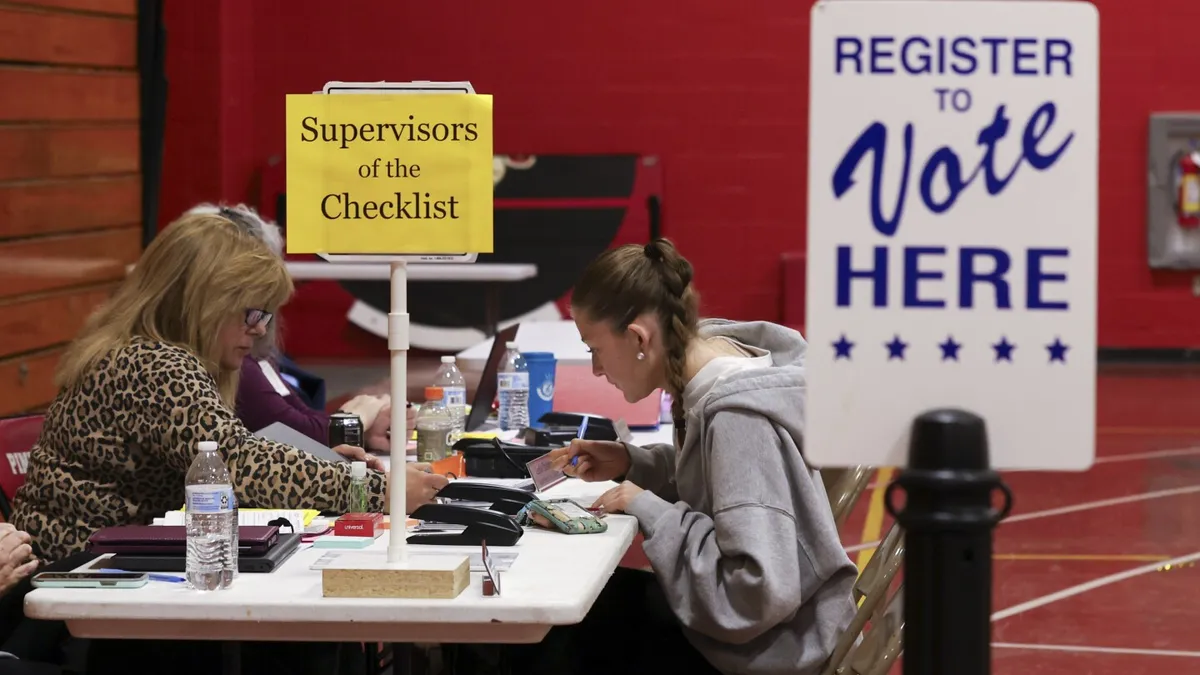
In a significant move, President Donald Trump signed an executive order on Tuesday that aims to fundamentally change the way Americans register to vote and how they cast their ballots. The order proposes broad election reforms, including requirements for proof of citizenship for voter registration and a strict deadline for returning mailed ballots on Election Day. However, this initiative has sparked widespread concern among election officials, state attorneys general, and legal experts, who argue that it may face substantial legal challenges due to its potential infringement on state powers defined in the U.S. Constitution.
Colorado's Democratic Secretary of State, Jena Griswold, labeled the executive order as "unlawful," asserting that such sweeping changes cannot be enacted through executive action. David Becker, a former attorney with the U.S. Justice Department and current head of the nonprofit Center for Election Innovation and Research, echoed these sentiments, emphasizing that the order oversteps presidential authority. New Jersey Attorney General Matt Platkin indicated that his state, along with others, is likely to challenge the executive order, which he claims threatens the integrity of state election regulations.
The Trump administration defends its actions by arguing that it is necessary to secure U.S. elections from what the president inaccurately claims is widespread voter fraud, which he insists contributed to his loss in the 2020 election. Ultimately, the legality of this executive order will be determined by the courts.
Trump's order introduces dramatic alterations to the procedures surrounding voter registration and elections. One of its key provisions mandates that all ballots must be returned by Election Day, rather than merely postmarked by that date, with the threat of losing federal funding for non-compliance. Legal experts argue that this claim of authority exceeds the limits set by the Constitution, which grants states the responsibility to determine the "times, places and manner" of elections.
As outlined in Article I, Section 4 of the Constitution, the regulation of elections is primarily under the purview of the states, with no explicit mention of presidential authority over election administration. Becker noted that any nationwide voting issues requiring resolution are traditionally addressed through congressional action, not executive orders. "The Constitution was very clear: The president is not king," he stated.
Critics of the executive order, including Sean Morales-Doyle from the Brennan Center for Justice, have condemned it as "statutorily and constitutionally" illegal. One contentious provision requires documentary proof of citizenship, which could violate the National Voter Registration Act. This is not the first instance of a president issuing an election-related executive order; in 2021, President Joe Biden directed federal agencies to enhance voting access, a move met with criticism from Republicans who argued it overstepped his authority.
Trump's executive order also directs the Election Assistance Commission (EAC), an independent bipartisan agency, to revise its federal voter registration form and guidelines for voting systems. Critics argue that, as the EAC is designed to operate independently, the president cannot simply dictate its actions. Jonathan Diaz from the Campaign Legal Center emphasized that the president's directives threaten to undermine the independence of this agency.
Even if the courts uphold Trump's executive order, various sections could face further legal challenges, especially if they disenfranchise eligible voters. Many Americans do not have immediate access to the required documentation to prove their citizenship. For instance, recent elections in New Hampshire where proof of citizenship was mandated saw some women unable to provide proper documentation due to name changes after marriage.
Furthermore, the order grants the Department of Homeland Security and the Department of Government Efficiency the authority to obtain and scrutinize state voter registration lists and potentially sensitive data. This could lead to wrongful flagging of eligible voters for removal from rolls or even criminal prosecution, instilling fear and discouraging voter participation, according to Xavier Persad from the American Civil Liberties Union (ACLU).
Organizations such as the ACLU, the Campaign Legal Center, and Common Cause are actively reviewing the executive order for potential legal challenges. Prominent election attorney Marc Elias has already announced plans to file lawsuits against the order. While some Republican officials have praised the order for its intent to ensure election integrity, many Democratic leaders are preparing to defend their states’ election laws against what they see as unconstitutional overreach.
Washington state Attorney General Nick Brown expressed skepticism about the order’s legality, stating that voting systems have historically been managed by states and counties. "I don’t think any serious lawyer looking at it thinks the order is legal," he remarked.